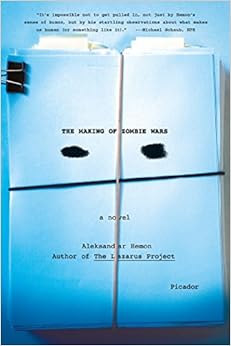Aspiring writer Joshua Levin churns through multiple failed screenplay ideas while balancing a relationship with a child psychologist and a job teaching ESL classes. Just when he hits upon a concept with momentum – a zombie-survival action script – his life begins to unravel. His landlord’s behavior escalates from “quirky” to “deranged,” his embarrassing father reveals some depressing health news, and he begins a doomed affair with one of his students, a Bosnian wife and mother. Eventually, Josh’s life, formerly stuck in a comfortable stasis, becomes as manic as one of his treatments.
Aleksandar Hemon has a reputation as a “heavy” writer: alienation, loss of identity, and the ravages of war loom large over much of his oeuvre. His first English-language story, on the other hand, presented the (regrettably fictional) life of a legendarily flatulent politically influential nymphomaniac. This strain of dark humor has injected itself prominently into Hemon’s most recent novel, a book that is often savagely violent yet irrepressibly entertaining. The (intentionally?) terrible screenplay ideas that come up from time to time are reason enough to keep reading, but we’re also treated to the spectacle of Josh pondering the implications of toys found in his girlfriend’s closet, of the irony of his domineering sister’s complete lack of control over her own child, and of his landlord’s obliviously creepy offers of friendship while casually brandishing a sword.
Behind this captivating craziness, however, is another very sobering look at the destructiveness wrought by war. Stagger the landlord is eventually revealed to be deeply affected by his military service during the Gulf War, and Josh encounters several Bosnian War veterans whose lives were similarly upended. Meanwhile, as The Making of Zombie Wars is set circa 2004, the Iraq War is slowly unfolding in the background. If the heroic and resolute soldiers fighting the hordes of undead in Josh’s screenplay depict an idealized war, then the PTSD-afflicted veterans offer a realistic counterpoint. It is also telling that the zombie wars’ architect – Josh himself – is cast as a poor decision-maker.
And this brings us to the book’s biggest liability: Josh is not a likable or terribly interesting protagonist. His aforementioned lack of judgment would be redeemable if he behaved foolishly with gusto, but instead, he makes bad choices seemingly because he lacks the wherewithal not to. While Jozef Pronek, the protagonist of the earlier Hemon novel Nowhere Man suffered from similar rudderlessness and artistic delusions, his status as a quasi-refugee contextualized his disappointment and inspired sympathy. Josh, the product of a comfortably middle-class American family, comes across as a loser in comparison.
Despite this, The Making of Zombie Wars is an apt showcase for Hemon’s many talents: a prose craftsman, a dark satirist, and a chronicler of human misery. There are relatively few actual zombie encounters in this book, but the humans that we are subjected to are, in many ways, amusingly and alarmingly worse.
8/10

No comments:
Post a Comment